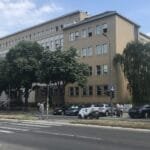“Every night I think that when I wake up in the morning, someone will call me, but for 25 years… nothing”, says Fitim Dubovci, who is looking for his father who disappeared in the 1998-1999 war in Kosovo.
Fitimi, from the village of Čikatovo in the municipality of Drenas, was not even ten years old when he lost his parents – Xheladin and Sofie Dubovci.
Letting go of the hand that held him tightly, while the Serbian forces drove them out of the house, is the last image that Fitimi remembers with his mother.
“He was wounded by the Serbian forces while we were walking in the crowd of people, fleeing from the house, due to an offensive in 1998”, remembers Fitimi.
Every time he tries to remember that period, his vision haunts him somewhere. He says that his mother, then 48 years old, was injured on the road, while the rest of the family was forced to continue the journey without her.
“… it remained with the other wounded, or with those who were killed there”, says Fitimi.
Village by village, Fitimi and his family arrived in Vushtrri – about 35 kilometers away – where he says they stayed for about three months, until another offensive took place.
One morning, Fitimi recalls, Serbian forces took away all the men who had taken refuge in that house, including his father.
The profit remained with his brother, also a minor, and the path to salvation continued with some more distant family members.
In time, they found out that their mother had died and was buried in a mass grave in the village of Čikatovo. Her remains were not returned to her family for reburial until 2010.
Meanwhile, Fitimi does not know anything about his father’s location, even to this day.
“The father was taken alive, but today, only 1 percent believe that he might be alive somewhere,” says the 36-year-old, taking a deep breath.
During the 1998/99 war in Kosovo, around 13,000 people were killed, while over 800,000 people were displaced.
Of the approximately 6,000 people forcibly disappeared at that time, more than 1,600 remain missing today. Many of the missing were found over the years in mass graves in Serbia.
According to the Kosovo Governmental Commission for Missing Persons, during the year 2023, 15 locations within the territory of Kosovo were excavated, which are related to the process of clarifying the fate of missing persons, as well as at a location in Serbia.
“Exhumed are the mortal remains of twenty individuals – victims of the war, although the number of exhumed persons and their identity will be determined after all forensic examinations and identification through DNA analysis are completed,” the report states. of the Government Commission of Kosovo.
The declaration of the missing does not apply
To increase the efforts in this direction, Kosovo and Serbia, a year ago, agreed on the joint Declaration for missing persons, within the dialogue for the normalization of relations mediated by the European Union.
The commitments that were made with this statement include: full access to reliable information, including those with classified status; making available all relevant documents for determining the fate of missing persons, as well as joint work through a commission chaired by the European Union.
A year later, none of this in practice, all only on paper.
The EU spokesperson, Peter Stano, confirms that the Joint Declaration, approved by the Prime Minister of Kosovo, Albin Kurti, and the President of Serbia, Aleksandar Vučić, in May 2023, “is not being implemented yet”.
“This will happen after the parties agree on the terms of reference of the Joint Commission, which is expected to monitor the implementation of the Joint Declaration, in support of the work of the Working Group chaired by the International Red Cross”, says Stano.
He emphasizes that the Declaration is not legally binding, but adds that the EU calls on the parties to engage “constructively” within the dialogue, to reach agreement on the terms of reference.
The Kosovo Government Office did not respond to Radio Free Europe’s questions on this topic, namely the terms of reference, but the head of the Governmental Commission for Missing Persons in Kosovo, Andin Hoti, says that they are related to technical issues related to with the duties of the Joint Commission.
Hoti says that the parties agreed with each other’s comments on the terms of reference as early as December of last year.
“In January, [Miroslav] Lajcak [EU emissary for Kosovo-Serbia dialogue] sent us some new comments from Serbia and I told him that we are no longer commenting on Serbia’s comments, but please form the commission common”, says Hoti.
He accuses the chairman of the Serbian Commission for Missing Persons, Velko Odallović, of making the information about the missing persons conditional on his presence in Kosovo.
The government of the prime minister of Kosovo, Albin Kurti, refuses meetings with Odallovic, saying that he was the main person of Slobodan Milosevic’s regime in Kosovo and that he should be questioned about the missing persons, and not be part of the Commission to the disappeared. Such claims, however, are dismissed in Belgrade.
Odallovic says that without functional working groups, it is not possible to work on clarifying the fate of the missing and the responsibility for this passes to Kosovo.
“On April 16, 2021, we held our last meeting in Belgrade. The entire delegation from Pristina was here. We should have meetings alternately, Belgrade, Pristina, Belgrade, Pristina… Pristina was the one that had to schedule the next meeting. And we didn’t have that meeting. I do not condition anything. Simply, I am asking for the working groups to meet”, says Odallovici.
From that time, the working groups of Kosovo and Serbia held an extraordinary meeting in Geneva, on January 31 of this year. The teams were led by someone else – not Hoti and Odallovici.
“What they have against me, personally, is their problem, not mine. I have not disputed any of their representatives and I will not dispute it. Whoever the Prishtina side puts at the head of the commission is acceptable to us”, says Odallovici.
He did not answer the question regarding the terms of reference of the Commission that would monitor the implementation of the Joint Declaration on the Disappeared, but only stated that “the dysfunction of the working groups harms the families of missing persons”.
Despite the non-implementation of the Declaration, Hoti says that the activities on the ground have continued, but, according to him, the challenge for Kosovo remains the territory of Serbia.
According to Hoti, during this year work is being done in four locations in the territory of Kosovo, while ten potential locations are being considered.
“Serbia [at the Geneva meeting] said that we have several different locations that could be mass graves, or could be suspicious locations for missing persons, but we are still investigating or receiving more information from the prosecution. , the court or the police”, says Hoti.
“Apart from the answers or words they gave in January… there was no implementation, concrete action or result”, he adds.
The Commission in Belgrade says that at the meeting in Geneva, information was exchanged “from both sides about possible locations that should be checked during 2024”.
“After the working meeting held in Geneva, we invited to the meeting the representatives of the Public Prosecution for War Crimes and the Service for the Detection of War Crimes of the Ministry of Internal Affairs, we informed them about the meeting and shared with them all the information we received from Pristina “, said in a statement of the Government Commission of Serbia.
“Unfortunately, the Declaration has not yet come into force, because it has not been agreed on the tasks of the Joint Commission, which the Declaration envisages as a support mechanism for the Working Group on Missing Persons”, according to the Serbian Government Commission.
“Unfortunately, the Declaration has not yet come into force, because it has not been agreed on the tasks of the Joint Commission, which the Declaration envisages as a support mechanism for the Working Group on Missing Persons”, according to the Serbian Government Commission.
For the implementation of the Declaration, Hoti says that he sent a letter to the president of Serbia in June 2023, asking him to open the archives, including the confidential ones. A letter about the non-implementation of the Declaration says that he sent it twice to the head of the EU’s foreign policy, Josep Borrell.
“Unfortunately, neither from Vucic – which was expected – nor from Borrell and Lajçak, I have not received any letter until today, no answer until today”, said Hoti during a meeting with the Parliamentary Commission for Human Rights, on April 23.
Family members demand greater international pressure
Ahmet Grajçevci, chairman of the Coordinating Council of Associations of Family Members of Missing Persons in Kosovo, says that from the beginning he was skeptical about the implementation of the Joint Declaration.
Speaking for Radio Free Europe, he says that only a great pressure of the European Union towards Serbia would lead to the clarification of the fate of the missing persons.
“From the beginning I was skeptical, because Serbia is uncooperative. They don’t want to cooperate, but they try to make every conversation political…”, says Grajçevci.
“When it comes to the issue of the dinar, for example, it takes 24 hours for talks in Brussels, while the issue of missing persons is not resolved for decades”, he adds.
Without international pressure, there will be no progress in this matter, believes the coordinator of the Association of Family Members of Kidnapped and Missing Persons in Kosovo, Silvana Marinković.
She says that the Joint Declaration is, simply, “a dead letter on paper”.
According to her, the families of the missing persons are disappointed that the issue has been “put on the back burner” and that no one “is checking or using the information they provide to the working groups within the Government of Kosovo and Serbia”.
“Although everyone says that this is a humanitarian issue, it is not so. The issue of missing persons is a major political issue. “Many people would not benefit if the fate of the missing was enlightened,” says Marinkovici.
Profit demands that the issue of missing persons be treated as a humanitarian one, since, as he says, “this work is becoming political”.
“More can be done, but no work is being done,” he says.
Apart from his father, Fitimi also has five more distant family members missing.
“How many family members of missing persons have already died ‘with their eyes open’, because they did not know where their loved ones are.” /REL







